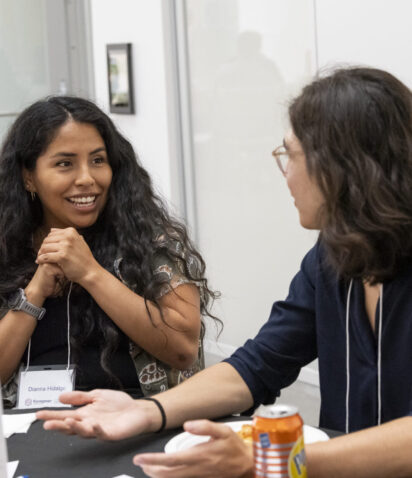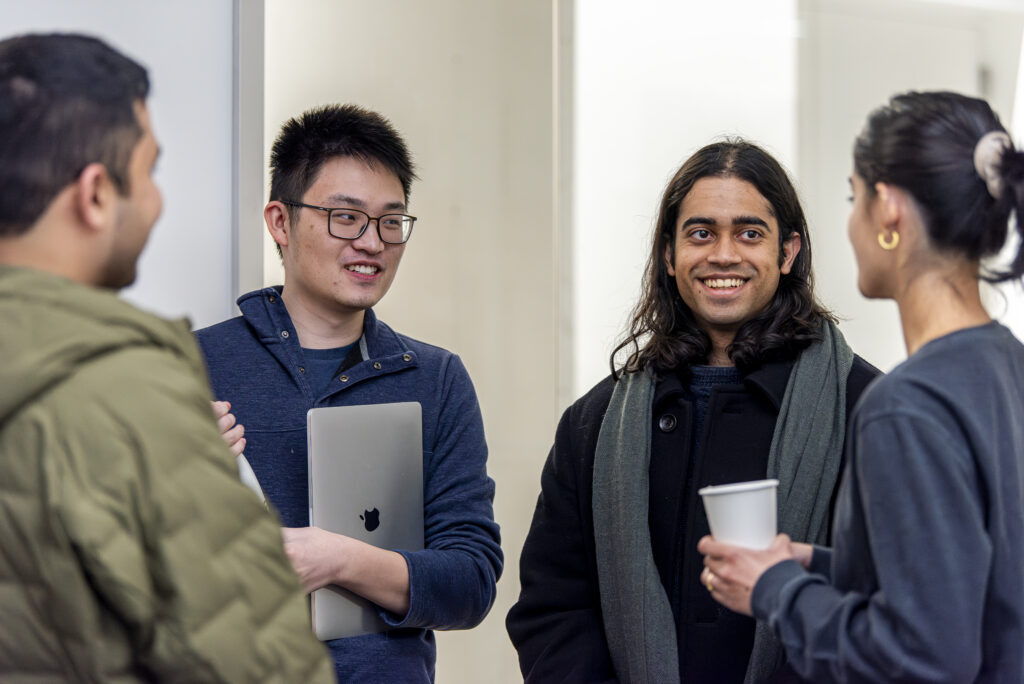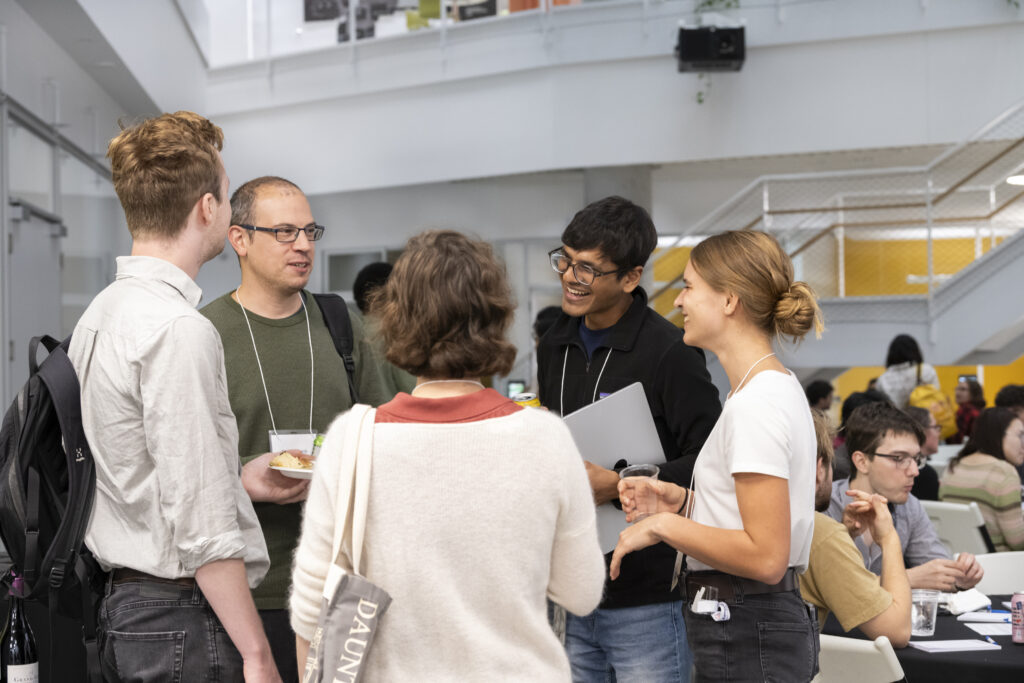Graduate Fellowship
Kempner Graduate Fellowships support a dynamic and diverse community of Ph.D. students across a number of graduate programs at Harvard, seeding new and innovative scientific discoveries in labs across the University.

The Kempner awards graduate student fellowships to a cohort of approximately 10-20 students each year. Each cohort is comprised of both incoming and continuing Harvard Ph.D. students.
Graduate students are a cornerstone of the Kempner Institute and represent one of its best opportunities to have a deep, positive impact on the fields of natural and artificial intelligence.
About the Graduate Fellowship
Overview and benefits

The Kempner offers graduate students financial support, mentorship, and opportunities for academic and professional collaboration, as well as access to one of the largest machine learning clusters in the world.
Support
Kempner graduate fellows receive a stipend, tuition, health insurance, and health fees for four years. Students who receive the fellowship in their first year of graduate school have the potential to renew for two additional years upon evaluation in the third year. Kempner funding supplements any paid aid, e.g. external fellowships, training grants, and pay for teaching (per program-specific guidelines), up to the program-specified stipend rate. Fellows can apply for professional development funds starting in year two.
Access
Kempner graduate fellows have access to one of the largest academic machine learning clusters in the world, supported by an outstanding group of engineers. They also have access to various educational activities, including Kempner courses, bootcamps, workshops, and events. Fellows also have access to the new Kempner Institute facility, including shared working and collaboration space.
Mentorship

In addition to their dissertation and Ph.D. program advisors, Kempner graduate fellows meet annually with a member of the Kempner Institute education team, including the Associate Director of Educational Programs, who serve as a resource for the fellow, guiding the fellow on career development, participation in the Kempner community, course selections, and anything else of concern to the fellow.
Collaboration
Graduate fellows become part of a select cohort of exceptional students working in the same field, as well as a broad and diverse community of faculty, staff, and students, including: undergraduate, post-baccalaureate, and graduate students; Kempner research fellows and visiting scientists; and Kempner Institute faculty, associate faculty, and collaborators.

Components
While fellows have a primary research focus that is relevant to the Kempner’s mission, the fellowship offers students flexibility in their research: they can be jointly advised, they have the freedom to determine the direction of their research projects, and, most importantly, their research is not tied to any advisor’s funding source.
Kempner graduate fellows pursue research central to the Kempner’s core mission of understanding the basis of intelligence in natural and artificial systems. Kempner graduate fellows undertake research that is innovative and often multidisciplinary, and which has the potential to have a deep and lasting impact on the study of intelligence. Kempner graduate fellows will be required to present their research, meet with their Kempner mentor, and submit a progress report yearly.
Fellows must fulfill all requirements of their Ph.D. program, including participating in advisory committees and qualifying exams as specified by their Ph.D. program, and remain in good standing in their program.
Kempner graduate fellows are expected to embrace and train in the interdisciplinary nature of the Kempner, while fulfilling all the curricular requirements of their Ph.D. program. Fellows are encouraged to fulfill flexible electives in their Ph.D. program with courses that ensure exposure to all relevant disciplines, including machine learning, neuroscience, and cognitive science. Graduate fellows can (and are encouraged to) consult with the Associate Director of Educational Programs on course selection.
Fellows are expected to attend and participate in Kempner fellow-specific events and programming as often as monthly. These events may include workshops, symposia, social- and community-building events, and journal clubs.
Fellows are expected to actively engage in the Kempner’s intellectual and community-building work, participate in Kempner events and committees, and engage in Kempner’s educational activities. Fellows are strongly encouraged to take an active part in shaping the culture and programmatic offerings of the Kempner Institute, via any combination of participation in governance, events, curriculum development, and other community offerings.
Eligibility, Selection and Application Process
Incoming graduate students are recruited in collaboration with existing Ph.D. programs and must be invited to apply for the Kempner Graduate Fellowship. Students already enrolled in a Ph.D. program at Harvard can apply for Kempner Graduate Fellowships in their second year of study.
Applicants may be incoming or current second year students enrolled in a Ph.D. program at Harvard University. We seek candidates with demonstrated ability and creativity who study one or more of the following areas:
- Foundations of intelligence, including mathematical and computational models of intelligence, cognitive theories of intelligence, and the neurobiological basis of intelligence.
- Research and development of new AI or ML methodologies or models from an engineering perspective, as well as scientific studies focused on understanding deep learning. This includes the development of novel applications of artificial intelligence, covering areas such as LLMs, generative AI models, computational biology, and the analysis of high-dimensional neural and behavioral data.
The Kempner Institute evaluates students with a holistic approach to application review and considers:
- Relevance of the proposed research to the Kempner mission and vision.
- Likelihood for academic success as determined by past achievement (in light of past opportunities made accessible to the student).
- Commitment to diversity, equity, and inclusion.
- The extent to which the applicant is likely to collaborate or conduct research across fields of study and/or contribute in other meaningful ways to the Kempner community.
Incoming Ph.D. students: Incoming graduate students are recruited in collaboration with existing Ph.D. programs and must be invited to apply for the Kempner Graduate Fellowship. Because each department has its own process of identifying potential applicants, the Kempner partners directly with relevant graduate programs to leverage the Kempner Graduate Fellowship to support the recruitment of competitive, top-tier, diverse, and talented students.
Second-year Harvard Ph.D. students: Students already enrolled in a Ph.D. program at Harvard can apply for a Kempner Graduate Fellowship in their second year of study. Students who receive fellowship funding from other sources are welcome to apply.
To apply, students must provide a CV, academic transcript, and a research statement (750 words maximum) describing their current or proposed area of research, how their research is relevant to the Kempner mission and vision, and how receiving a Kempner Institute Graduate Fellowship will benefit their research.
Additionally, their mentor or another faculty member must submit a letter of support that directly addresses their likelihood for academic success, the relevance of the proposed project to the Kempner mission, and the extent to which the applicant is likely to collaborate across fields of study or contribute in other meaningful ways to the Kempner community.
Applications for the 2025-26 academic year are closed. The next round of applications will open in December 2026.



